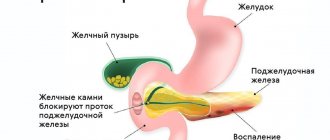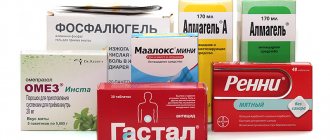Diseases of the digestive system: esophagitis, gastritis, peptic ulcer of the stomach and duodenum, duodenitis, enteritis, colitis, digestive disorders and others
The human digestive system performs various functions - processing food, extracting useful substances from it, ensuring their absorption into the bloodstream. Interruptions in the functioning of even one of the digestive organs can cause serious problems for the entire system. The causes of such disorders are modern ecology, new products and medications, stress, untimely nutrition, bad habits, and hereditary factors.
Digestive diseases affect people of all ages. Among the most common pathologies are esophagitis, gastritis, peptic ulcer of the stomach and duodenum, duodenitis, enteritis, colitis.
Cost of consultation?
| Name of service | Price, rub.) |
| Primary appointment with a general practitioner | 2000 rub. |
| Repeated appointment with a general practitioner | 1500 rub. |
| Initial appointment with a gastroenterologist | 2000 rub. |
| Secondary appointment with a gastroenterologist | 1500 rub. |
| Prescription of treatment (drawing up an individual treatment regimen) | 1500 - 3000 rub. |
All our services and prices
Esophagitis
Esophagitis
– damage to the mucous membrane of the esophagus, which can cause serious complications such as peptic ulcers, stenosis, Barrett’s disease. The main symptoms of esophagitis are impaired swallowing reflex, heartburn, and chest pain. Diagnosis of the disease includes x-rays of the organ, endoscopic biopsy, and laboratory blood tests. Treatment is prescribed strictly individually, taking into account the etiology of esophagitis and consists of drug therapy and a special diet. In severe cases, surgical intervention is possible.
Gastritis
Gastritis
– one of the most common diseases occurring in acute or chronic form in adults and children. These are inflammations of the gastric mucosa of different origins, which are characterized by pain in the epigastric region, heartburn, nausea, dyspepsia, bad taste and bad breath. An important condition for the treatment of gastritis is maintaining proper nutrition and diet, as well as taking medications and traditional medicine - infusions of chamomile, mint and other herbs. Patients are strictly prohibited from drinking alcohol!
CREON® capsules for better digestion
The digestive process is inextricably linked with pancreatic enzymes. These special substances perform an important role: they help the body digest and absorb food. Errors in nutrition, consumption of fatty foods or incompatible foods can affect your well-being and cause heaviness after eating, discomfort, and bloating. This happens when the body’s own strength (the usual amount of enzymes) is not enough to digest what is eaten.
Creon® contains digestive enzymes identical to those produced by the body3. By delivering them from the outside, the drug complements its own digestion and helps cope with the symptoms of indigestion: heaviness and discomfort after eating.
To learn more
Creon® is a convenient modern product in the form of capsules, each of which contains hundreds of small particles - minimicrospheres. Each of the Creon® particles does not exceed the size of 1.7 mm - they are so tiny3. This size is designated for a reason: modern scientific works, Russian and world scale, are unanimous that an effective enzyme preparation should have particles less than 2 mm in size5-8. Today, only Creon® meets the size requirements*4 and is therefore considered the first choice for better digestion, which cannot be said about the well-known drugs in tablet form**1,4,5,9. Their time, unfortunately, has passed, and today they are recognized as the least effective5,9.
The Creon® capsule has no equal:
No. 1 in the world
for better digestion10
15 minutes
and Creon® is maximally active11, 12
Peptic ulcer of the stomach and duodenum
Stomach ulcer
and
duodenum
- a chronic disease, which is characterized by the appearance of pathological foci on the mucous membrane of the organs. The causes of its occurrence are considered to be infection of the stomach and duodenum by bacteria, as well as irregular nutrition, stress, prolonged use of medications, hypersecretion of gastric juice, and smoking. The main symptoms of the disease are frequent pain in the upper abdomen, especially on an “empty” stomach. Peptic ulcers of the stomach and duodenum are dangerous due to their complications - internal bleeding, perforation of the intestinal walls with penetration of its contents into the abdominal cavity and the development of peritonitis, as well as stenosis (intestinal obstruction). Treatment is carried out under the supervision of a gastroenterologist. Self-medication is prohibited! To suppress infection, antibacterial drugs are used, as well as antacids and gastroprotective agents. Throughout the course, you should adhere to a diet, stop smoking and drinking alcoholic beverages.
Treatment of indigestion
Basic principles of treating digestive disorders2:
- adjusting the diet towards a healthy and nutritious diet.
- healthy sleep (for an adult 7-9 hours).
- giving up alcohol and smoking, which irritate the mucous membrane of the stomach and intestines, maintaining a constant inflammatory process. If sudden changes in lifestyle are difficult, you need to at least limit bad habits. For example, reduce the number of cigarettes you smoke.
The main goal of treatment is to restore the natural process of food digestion, eliminate digestive problems, and relieve symptoms. To do this, the following rules must be observed:
1. It is not recommended to overeat before bed, because... food can take a long time to pass through the digestive tract and cause discomfort.
2. Nutrition should be complete and varied, consisting of foods high in fiber.
3. In cases of malnutrition (for example, when eating a lot of fatty foods), digestion can be supported with special medications.
Duodenitis
Duodenitis
– inflammation of the mucous membrane of the duodenum, affecting its upper and/or lower sections. The main symptoms are general weakness, pain in the stomach, heartburn, nausea, belching. If you follow a gentle diet, acute manifestations usually end after a few days. The chronic form of duodenitis is characterized by frequent relapses. With untimely medical care and proper treatment, complications such as intestinal bleeding, perforation of the intestinal wall, and pancreatitis may occur.
Enteritis
Enteritis
– a set of inflammatory processes that occur in the small intestine and are accompanied by disruption of its function. The main symptoms are upset stool, bloating, pain in the navel, general weakness, pale skin. The causes of the disease are intestinal infections, poisoning with toxic substances, overeating spicy or fatty foods, and a tendency to allergies. Enteritis may be a consequence of other diseases of the gastrointestinal tract. The diagnosis is made on the basis of bacteriological examination of stool, biochemical blood test, and X-ray examination of the intestines. Acute enteritis is treated in a hospital. The patient is prescribed bed rest, dietary nutrition, enzyme preparations, as well as decoctions of chamomile, mint, and blueberries.
Digestive disorder
Gastritis
Diarrhea
8272 10 November
IMPORTANT!
The information in this section cannot be used for self-diagnosis and self-treatment.
In case of pain or other exacerbation of the disease, diagnostic tests should be prescribed only by the attending physician. To make a diagnosis and properly prescribe treatment, you should contact your doctor. Digestive disorder: causes of occurrence, what diseases it occurs with, diagnosis and treatment methods.
Definition
Diseases of the gastrointestinal tract that cause indigestion are among the most common in the population. Signs of digestive disorders to one degree or another are observed in almost a quarter of the world's population, but the majority do not seek help from doctors and treat themselves, which in some cases threatens to develop complications.
Diseases of the digestive system can occur in childhood or adolescence and become chronic.
Types of digestive disorders
Digestive disorders can be divided into two large groups.
The first includes diseases caused by a lack of pancreatic enzymes and substances necessary for digesting food - gastric juice, bile. In these cases, characteristic symptoms are heartburn, belching, bloating, colic, and pain in the iliac region.
The second group includes disorders caused by impaired absorption processes in the intestine. These disorders are characterized by spastic pain, increased peristalsis (rumbling) in the abdomen, a feeling of fullness, unstable bowel movements (constipation or diarrhea), exhaustion, and muscle weakness.
Possible causes of indigestion
Doctors call dysmotility of the esophagus
. Pathologies of motor activity of the esophagus lead to difficulty in moving food into the stomach and, conversely, easy entry (reflux) of concentrated gastric juice onto the walls of the esophagus.
Another significant cause is functional dyspepsia
, which combines conditions caused by temporary (no more than 3 months) disruption of the stomach, duodenum and pancreas. Patients complain of pain or discomfort in the iliac region, heaviness, a feeling of fullness in the stomach after eating the usual amount of food, bloating, nausea, vomiting, belching, heartburn. The pain is characterized by frequency (on an empty stomach or at night) and rapid cessation after eating or taking medications that reduce stomach acidity.
If the pain is localized in the left hypochondrium or is girdling in nature, then problems with the pancreas can be suspected; if in the right hypochondrium, dysfunction of the liver and gall bladder can be suspected.
When examining such patients, it is often not possible to identify “organic” diseases (ulcers, tumors, pancreatitis).
Digestive problems may result from functional disorders of the biliary tract
(biliary system). They are based on a violation of synchronicity in the functioning of the gallbladder and the sphincter of Oddi, through which bile enters the duodenum. With sphincter spasm, not only stagnation of bile in the gallbladder occurs, but also disruption of the pancreas, which together leads to acute pain, which is often localized in the right hypochondrium and can radiate to the back. Attacks are triggered by eating fatty and spicy foods, cold drinks, and stressful situations. Pain in the right hypochondrium can be combined with a feeling of fullness. Characteristic symptoms also include nausea, bitterness in the mouth, bloating, and constipation.
Another cause of indigestion is irritable bowel syndrome.
- painful conditions in which pain or discomfort in the abdomen goes away after a bowel movement. In this case, stool is characterized by irregularity with a predominance of diarrhea (diarrhea) or constipation.
The causes of irritable bowel syndrome include infectious diseases, nervous stress, poor quality nutrition, consumption of large amounts of gas-forming foods, and overeating.
The main symptoms of this disease are bloating, cramping pain in the abdomen, which usually intensifies after eating and subsides after bowel movements. It is noteworthy that at night the pain stops.
With diarrhea, the number of bowel movements can reach 5 times a day, and the urge to defecate may occur after every meal. There is often a feeling of incomplete bowel movement. With constipation, the character of feces resembles “sheep’s”, consisting of small dense pellets. So-called constipative diarrhea may occur - loose stools after several days of delay.
Which doctors should I consult for indigestion?
It is important to remember that the initial symptoms of spasm and impaired motility of the esophagus most often occur in childhood (regurgitation, sudden vomiting of unchanged food immediately after eating, pain when swallowing) and require consultation with a pediatrician.
If such symptoms appear for a long time (more than a month) in an adult, you should visit a general practitioner to receive a referral for examination of the gastrointestinal tract and make an appointment with a gastroenterologist.
The treatment of functional digestive disorders, including irritable bowel syndrome, is carried out by internists, gastroenterologists and psychotherapists.
Diagnosis and examinations for digestive disorders
If a disease of the esophagus is suspected, fluoroscopy is prescribed, which can reveal a violation of the passage of barium suspension into the stomach and dilation of the esophagus. To exclude organic lesions of the esophagus, esophageal manometry and esophagoscopy are performed.
Diagnosis of functional dyspepsia usually involves a clinical blood test; blood chemistry; stool occult blood test; C-urease test for diagnosing Helicobacter pylori infection; gastroduodenoscopy for the purpose of visually assessing the condition of the stomach wall and excluding its ulcerative lesions and tumors; Ultrasound of the liver, gallbladder and pancreas to clarify their condition.
Colitis
Colitis
– pathological changes in the mucous membrane of the colon due to infectious, toxic, drug damage. The main symptoms are severe pain, diarrhea, constipation, flatulence. To make a correct diagnosis and prescribe medications, stool examinations for the presence of helminths and protozoa, colonoscopy, biopsy, and laboratory blood tests are performed. Treatment is prescribed taking into account the results obtained and includes taking antibacterial drugs, enzymes, probiotics, as well as herbal medicine and dietary nutrition.
Sign up for a consultation
Make an appointment
Creon minimicrospheres® - what are their advantages?
1. Complete digestion of food. When it enters the stomach, the Creon® capsule quickly dissolves, and the smallest particles are evenly mixed with food3,12. This allows them to participate in the digestion of the maximum amount of food eaten.
2. 1 capsule of Creon® 10000 - this may be enough for heaviness after eating3. The number 10,000 indicates the amount of the lipase enzyme, which is responsible for the breakdown of fats. For comparison: in some well-known tablets the lipase content does not exceed 3,500 units, this is almost 3 times less than Creon® 10 0003. That is why their instructions for medical use indicate that an additional 2 to 4 may be required 13 tablets per dose.
More information about the action of the drug and its advantages over analogues can be found here. Creon® is recommended to be taken with meals or immediately after3.
Where can you get examined, prevented and treated for diseases of the digestive system in Moscow?
In a multidisciplinary medical center you can always undergo examination, prevention and treatment of diseases of the digestive system
. Our medical center is located between the Konkovo and Belyaevo metro stations (South-Western Administrative District of Moscow in the area of the Belyaevo, Konkovo, Teply Stan, Chertanovo, Yasenevo, Sevastopolskaya, New Cheryomushki metro stations " and "Trade Union"). Here you will find highly qualified personnel and the most modern diagnostic equipment. Our clients will be pleasantly surprised by our quite affordable prices.
Causes of indigestion
Each organ of the digestive system takes part in the digestion of food and the removal of metabolic products from the body2.
The most common causes of indigestion are 2:
- the habit of eating in a hurry, on the run;
- the predominance of fats and simple carbohydrates, semi-finished and instant foods in the diet;
- lack of plant products in the diet (vegetables, fruits, legumes and whole grains);
- lack of digestive enzymes resulting from poor nutrition, inflammation in the intestines, disruption of the digestive system;
- constant stress.
Digestion is one of the steps of another complex and vital process, metabolism. Failures in the process of digesting food (digestive disorders) not only add physical inconvenience, they can significantly affect well-being.










